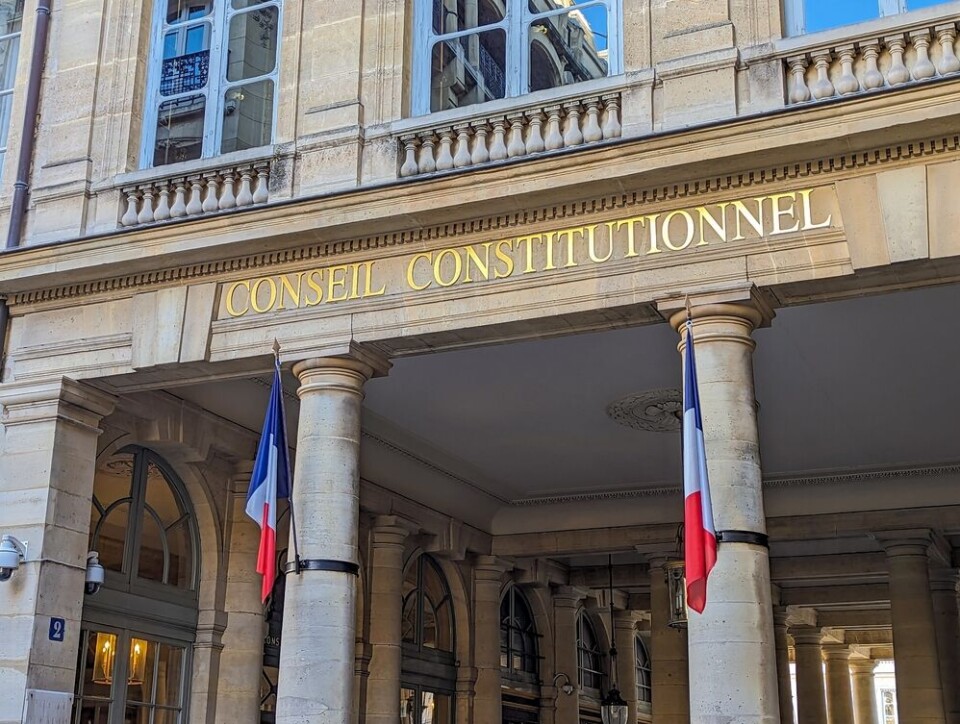-
QR code to replace paper instructions for 100 medicines in France in new trial
Paracetamol and cholesterol medication to be included in scheme that launches this autumn
-
Can visa-free travel days under 90-day rule be used to enter France before start of visa?
Be wary of spending too much time in France or you may be seen as a tax resident
-
Online ‘anti-waste’ supermarket offers deals on everyday items in France - we test it
Discounts of 10% to 50% available on brand products
France second-home visas: when is ruling due and when could it start?
The nine ‘sages’ of the Conseil constitutionnel are set to scrutinise the immigration law this week

Article published January 23, 2024; updated January 25, 2024
British second-home owners will know by the end of Thursday January 25 if they will have an ‘automatic visa’ right for extended stays in France, or not.
France’s immigration law – including a new ‘automatic visa’ right for British second-home owners – was voted through definitively by parliament before Christmas but a final hurdle remains: vetting of the law by the Conseil constitutionnel.
The Conseil is set to scrutinise the law on Thursday January 25 and its decision will be made public at some point from 16:30 onwards on the day.
It could either:
- Accept the whole immigration law without question
- Declare the whole law to be contrary to the Constitution
- Accept the law as a whole but declare certain articles to be unconstitutional.
A decision is expected in the afternoon of Thursday, but the precise time has not yet been revealed.
A spokeswoman said: “The judges have not yet deliberated. They will start on Thursday morning.”
We will report further when the decision is available, as to whether or not article 1er K about the ‘automatic visa’ for second-home owners has been retained.
What is the ‘automatic visa’?
The ‘automatic visa’ is found in article 1er K of the immigration law and states that British people who own second homes in France should have a long-stay visa right automatically and without having to apply for a long-stay visa.
The aim of the article – which derives from an amendment put forward by Senator Martine Berthet (Savoie) – is, especially, to simplify life for thousands of Britons who bought before Brexit when they could freely visit their homes for up to half the year. However the article does not limit the benefit to those who bought before a certain date.
British second-home owners (with their main residence outside France) may currently only visit for more than 90 days at a time by undertaking a long, complex process to obtain a temporary long-stay visa before they come to France for this extended stay.
The process has to be started again for a future stay of more than 90 days.
Read more: Automatic visa for easy second-home visits passed by French parliament
What is the Conseil constitutionnel?
France’s constitutional council is one of the institutions of the Fifth Republic and is based in the Montpensier wing of the Palais-Royal, on rue de Montpensier, Paris.
Its current configuration consists of nine judges, referred to in French media as Les sages (the wise ones), or Les sages de la rue Montpensier or du Palais-Royal.
Its president is Laurent Fabius, a former Socialist minister, MP and one-time prime minister (1984-1986), who was appointed by then President François Hollande. Another former prime minister, Alain Juppé, is also one of les sages.
Its task is to check that laws do not clash with the Constitution (it also plays a role in checking that national elections and referendums are run properly).
Do we have any indication as to their view on article 1er K?
No, there have been no indications.
Some left-wing MPs stated in a letter to the Conseil that the article was one among many that they believe should be removed as they relate to amendments that, the MPs claimed, have nothing to do with the original intentions of the text.
The Constitution allows law articles to be censured by the Conseil if they have absolutely no connection with the subject of the text as it was originally submitted.
Senator Berthet has previously stated to us she does not think this is the case for article 1er K. The overall law relates to immigration matters, including residency cards, and border control, so it does not appear there is ‘no link’ at all between its purpose and the ‘automatic visa’ idea.
She previously told The Connexion: "You can see why, perhaps, some people might have appealed to the Conseil over certain other aspects [of the immigration law], but this one, frankly, I don't see why. We'll see what the Conseil has to say."
The Conseil’s decision will be final.
If article 1er K is retained, how soon could the automatic visa apply?
The final step is for a decree to be made by officials in the Interior Ministry in consultation with the top administrative body the Conseil d’Etat. This would set out the practical rules on how the scheme would work.
Border officials would also have to be briefed.
It is thought that if everything moves quickly, the ‘automatic visa’ might be in place by this summer, at the earliest.
It has been suggested that a simple application for a document to show at the border, proving home ownership, might be required.
What else is in the immigration law?
The law contains several measures such as requiring people applying for multi-year residency cards to pass a test in basic French, or creating a specific délit (medium-severity crime) of staying in the country illegally.
We reported previous on the contents at this link and here.
Read more
Why are Americans not part of second-home easy visit plan in France?
Normandy senator: British homeowners should not be penalised by Brexit
























